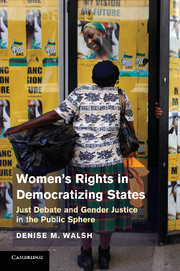Book contents
- Frontmatter
- Contents
- List of Figures and Tables
- Acknowledgments
- Abbreviations
- PART I JUST DEBATE
- PART II JUST DEBATE IN DEMOCRATIZING STATES
- 4 Just Debate Denied: Socialist and Post-socialist Poland
- 5 Just Debate Diverges: Regime Breakdown in Chile and South Africa
- 6 Just Debate Prevails: The Liberal Moment in South Africa
- 7 Just Debate Declines: Consolidation in South Africa
- PART III GENDER JUSTICE
- Bibliography
- Index
5 - Just Debate Diverges: Regime Breakdown in Chile and South Africa
Published online by Cambridge University Press: 06 December 2010
- Frontmatter
- Contents
- List of Figures and Tables
- Acknowledgments
- Abbreviations
- PART I JUST DEBATE
- PART II JUST DEBATE IN DEMOCRATIZING STATES
- 4 Just Debate Denied: Socialist and Post-socialist Poland
- 5 Just Debate Diverges: Regime Breakdown in Chile and South Africa
- 6 Just Debate Prevails: The Liberal Moment in South Africa
- 7 Just Debate Declines: Consolidation in South Africa
- PART III GENDER JUSTICE
- Bibliography
- Index
Summary
“It is a sad fact that one of the few profoundly non-racial institutions in South Africa is patriarchy.”
Albie Sachs, Member of the Constitutional Committee and the National Executive of the ANC, 1990“Imagine, if Pinochet is overthrown men are going to go on deciding everything.”
Chilean woman activistINTRODUCTION
The just debate approach claims that the openness and inclusiveness of public debate is a critical measure of democratic quality and a key factor in the advancement of women's rights. When public debate is open and inclusive, women, who are usually the largest marginalized group in public life, have access, voice, and the capacity for contestation in the institutions that compose the arenas of the public sphere. During democratization, the most important arenas are legislatures, civil society, and the media. Debate conditions in these three public arenas shape the content of public debate. As debate conditions improve, more demands for gender justice enter public debate and shape public opinion. Political actors who wish to be elected and avoid being labeled sexist will respond to those demands.
Although the just debate claim stems from a rich body of political theory, it has not been tested. In the previous chapter, I examined whether democratizing Poland disproved the just debate claim, because advances in women's rights were slight in the 1990s as the public sphere expanded. My analysis reveals that even as democratization advanced and the public sphere expanded, debate conditions remained limited.
- Type
- Chapter
- Information
- Women’s Rights in Democratizing StatesJust Debate and Gender Justice in the Public Sphere, pp. 118 - 156Publisher: Cambridge University PressPrint publication year: 2010



